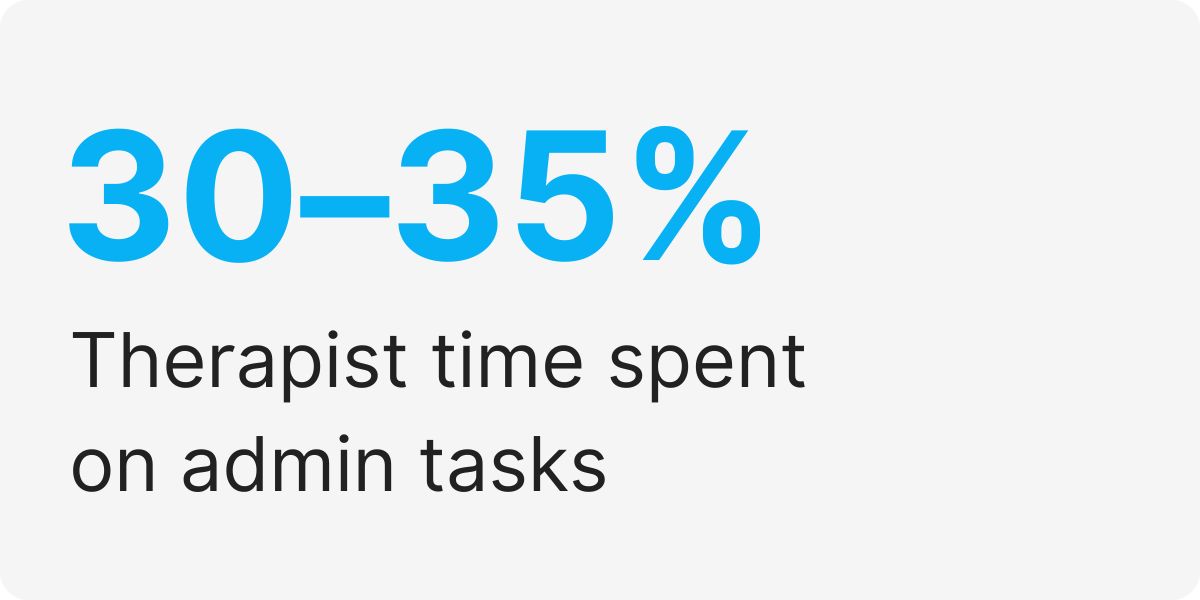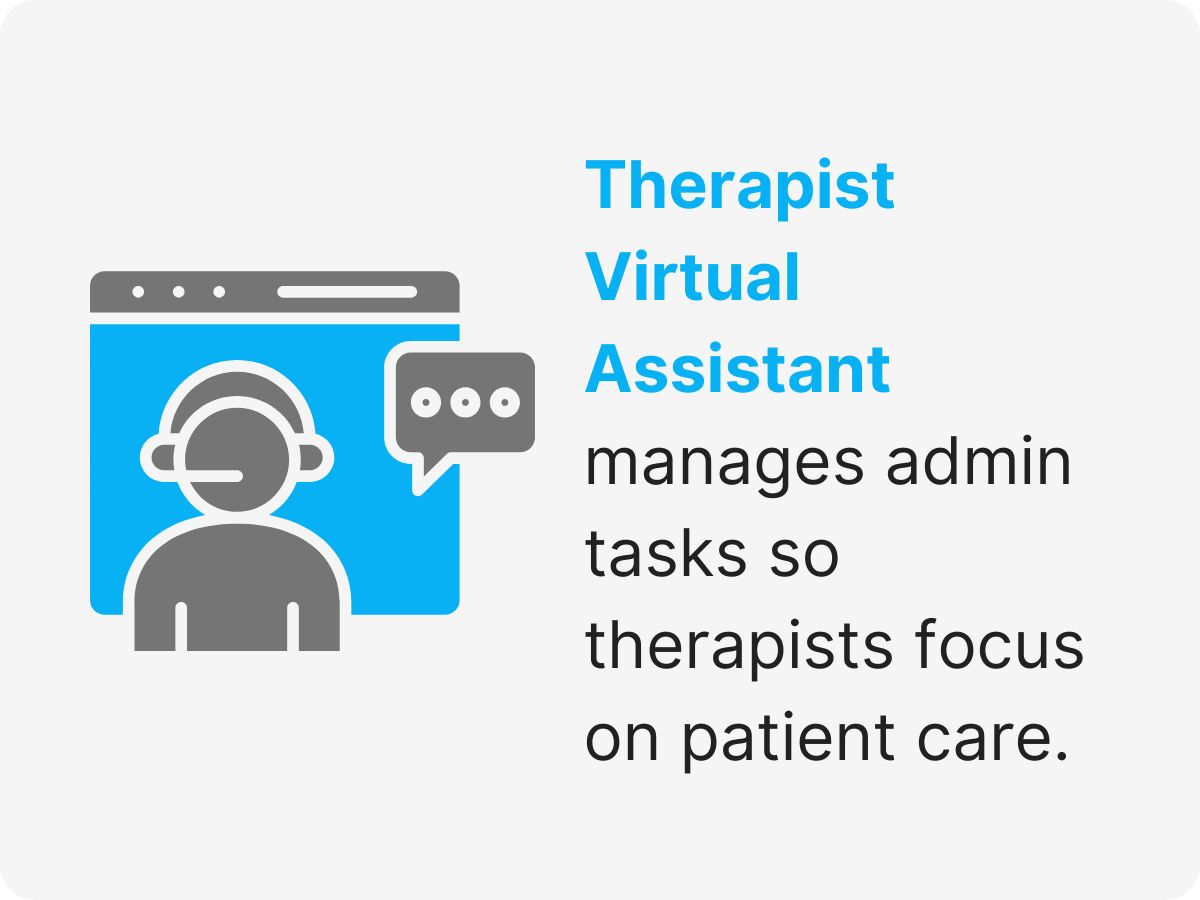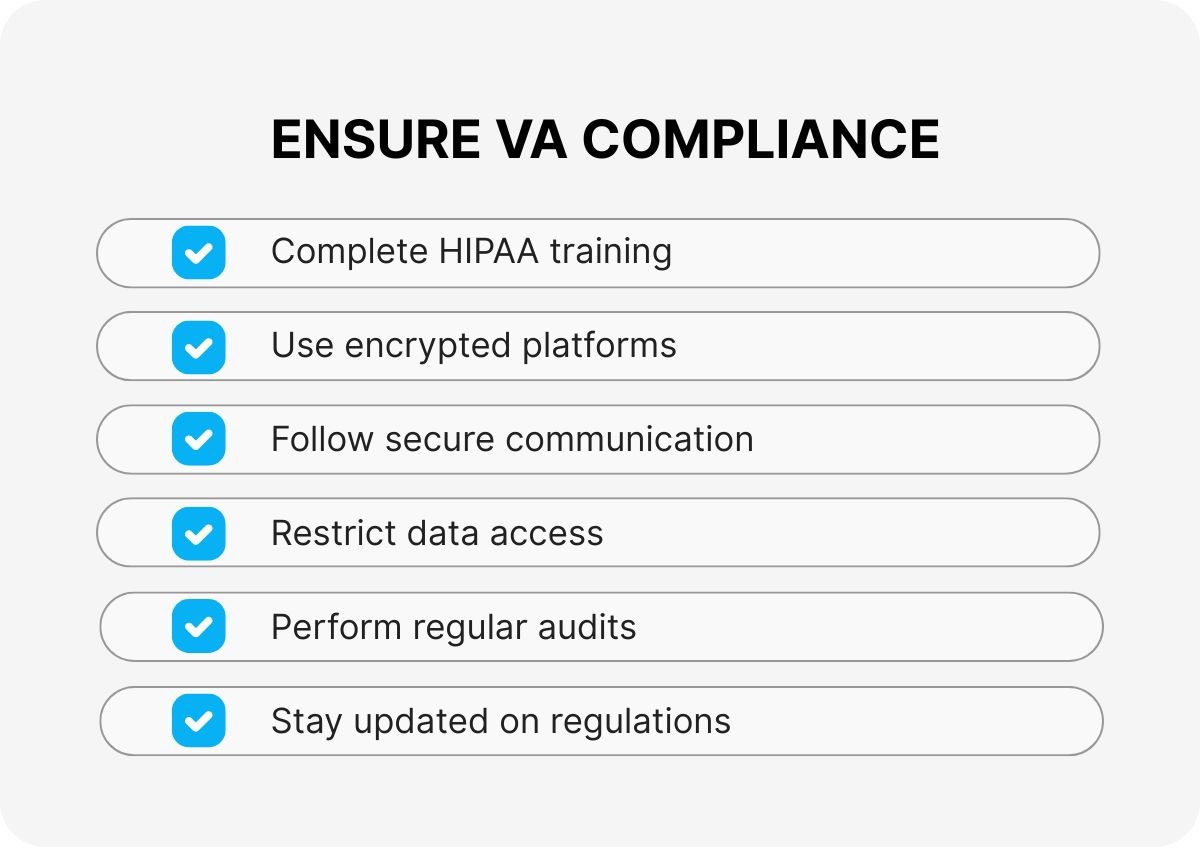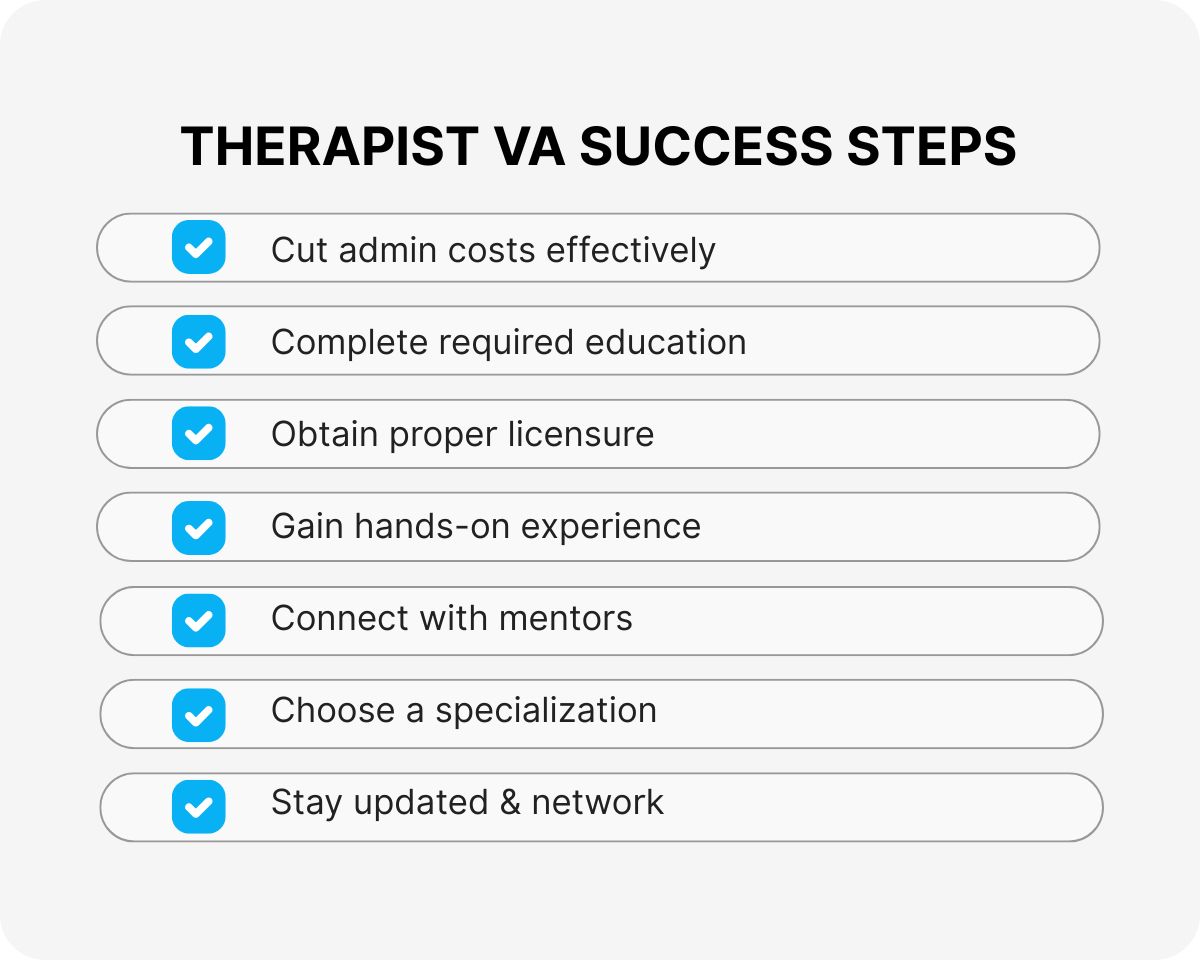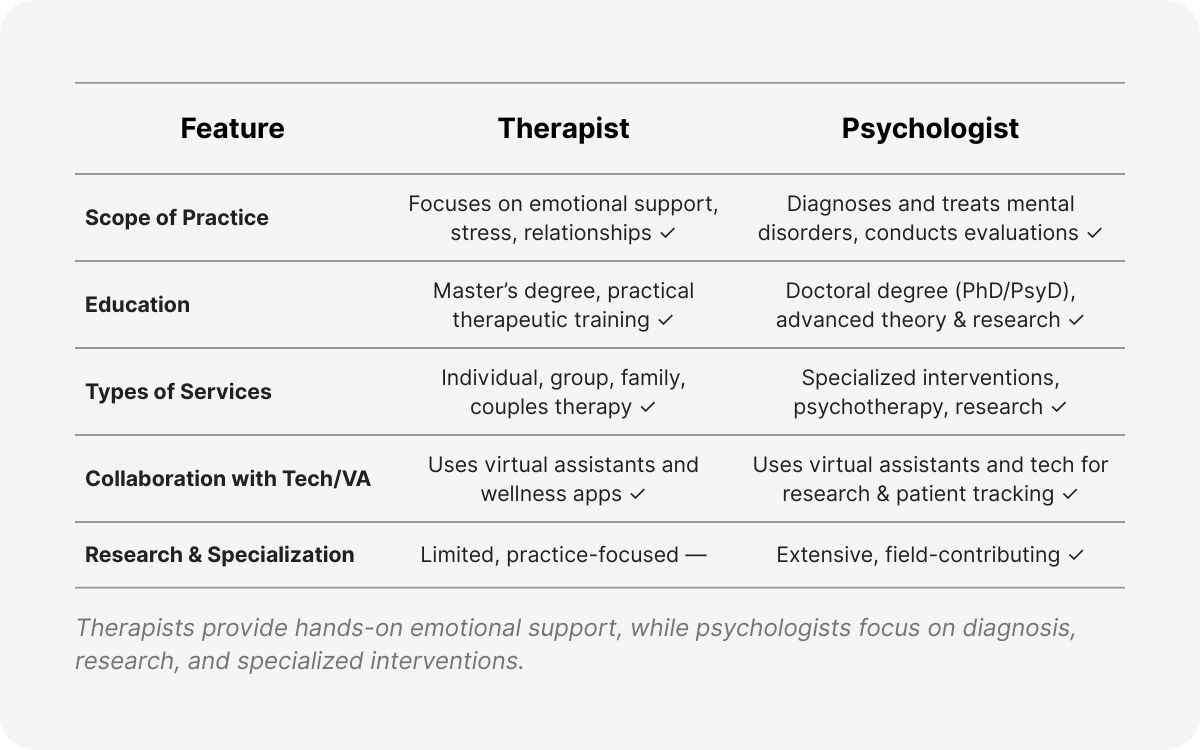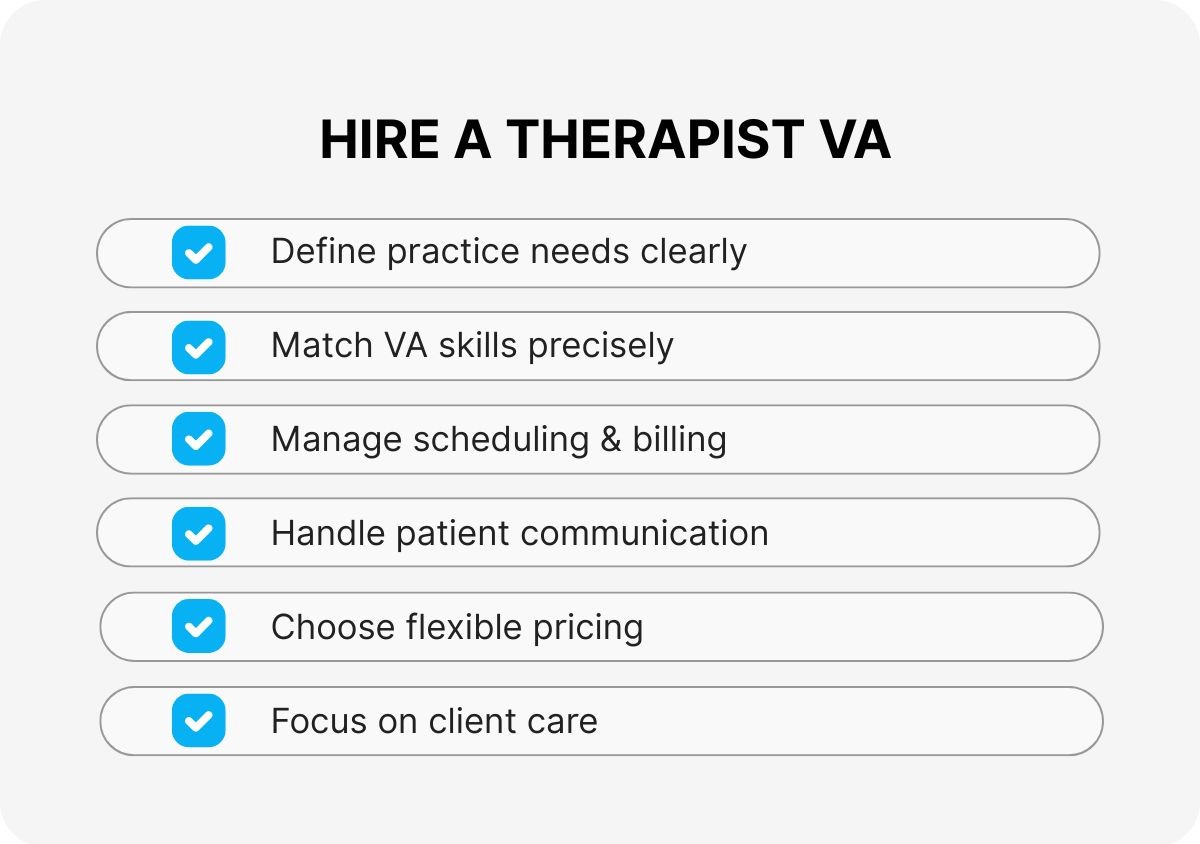A therapist virtual assistant helps mental health professionals stay focused on client care by managing admin tasks like scheduling, billing, and intake. Stealth Agents provides highly trained virtual assistants who streamline your workflow, giving you more time to focus on what matters most—your clients.
Therapists spend up to 30-35% of their work week on administrative tasks, including scheduling, billing, client communication, and documentation, time that could instead be devoted to patient care. In many practices, that non-clinical load translates to 5-10 hours a week lost to behind-the-scenes work. By engaging a therapy-savvy virtual assistant, you can reclaim those hours, reduce burnout, and improve client outcomes. With Stealth Agents, therapists get tailored support that handles admin efficiently, leaving them more present for what truly matters, the therapy.
Therapist Virtual Assistant services are becoming indispensable in managing therapy practices efficiently.
They offer essential virtual assistant services that handle administrative tasks, allowing therapists to focus more on patient care.
According to recent reports, the healthcare virtual assistants market is projected to grow at a remarkable CAGR of 34.01% from 2021 to 2028, highlighting the increasing demand for these services.
These assistants significantly enhance practice productivity by managing schedules, coordinating patient communications, and more.
Stealth Agents stands ready to assist therapists in finding, hiring, or outsourcing a Therapist Virtual Assistant. They offer a free discussion to tailor services and the therapist virtual assistant price rate to your specific needs.
How to Decide What to Delegate to a Therapist Virtual Assistant
Not sure where to start? Therapists often juggle a mountain of routine tasks that can quietly chip away at client-facing hours. To pinpoint which duties to delegate, start by listing all your daily and weekly responsibilities.
Look for jobs that are time-consuming, repetitive, or administrative, such as:
- Scheduling appointments and sending reminders
- Managing client inquiries and follow-ups
- Processing billing and insurance claims
- Organizing digital files and records
Benefits of Using a Virtual Assistant for Administrative Tasks
So, why consider a virtual assistant for handling time-consuming duties like email management, travel arrangements, and office operations?
For therapists juggling packed schedules, the answer is all about efficiency and peace of mind.
Here’s how a virtual assistant can make a difference:
-
Streamlined Office Management:
Virtual assistants keep your practice running smoothly by managing inventory, ordering supplies, and organizing documentation. No more last-minute scrambles for printer paper or lost paperwork.
-
Effortless Scheduling & Diary Management:
From booking appointments to juggling cancellations, a skilled assistant can handle the calendar chaos. Need to travel for a training or conference? They’ll line up flights, accommodations, and itineraries, so you can focus on growth, not logistics.
-
Inbox Zero – Made Possible:
Therapists often drown in emails from clients, colleagues, and insurance providers. A virtual assistant filters, organizes, and responds to routine messages, prioritizing urgent communications and freeing your time for real client care.
-
Cost Savings Over In-House Staff:
Unlike hiring a full-time admin, virtual assistants save you costs on salaries, benefits, and office space. Many mental health professionals discover they can reduce admin expenses by a significant margin—sometimes up to 90% compared to traditional staffing.
-
Enhanced Work-Life Balance:
Delegating admin tasks means you leave the office on time, tackle fewer after-hours tasks, and can even reclaim your evenings for self-care (or that Netflix queue).
By outsourcing these essential but repetitive responsibilities, therapists find themselves with more hours in the day, sharper focus for client sessions, and less stress from behind-the-scenes details.
Marketing Support That Grows Your Practice
Virtual assistants do more than just keep your schedule on track—they also play a vital role in boosting your online presence. With marketing-savvy VAs in your corner, you can:
- Keep your website and blog updated with fresh, relevant content
- Manage your social media channels, from drafting posts to engaging with followers
- Create and schedule newsletters to keep your clients and referral network informed
- Track analytics for your website and social feeds, offering insights and suggestions for improvement
What is a Therapist Virtual Assistant?
A Therapist Virtual Assistant offers remote administrative support to therapy practices, helping therapists focus on patient care.
They handle tasks such as scheduling, patient communication, billing, and record maintenance, which boosts operational efficiency.
This remote assistance provides a cost-effective solution without needing more in-office staff.
It is especially beneficial for small and medium practices looking to enhance service delivery without raising costs.
Meanwhile, outsourced physical therapy support is gaining popularity for its flexibility and adaptability to individual patient needs.
A Therapist Virtual Assistant brings specialized skills, allowing therapists more time for personalized care.
This role is crucial in focusing on therapeutic work while efficiently managing administrative tasks.
How Virtual Assistants Safeguard Patient Privacy and Ensure Compliance
Protecting patient confidentiality isn’t just a box to tick—it’s fundamental to building trust in therapy practices. Virtual assistants play a vital role in maintaining compliance with privacy standards, including HIPAA, every step of the way.
Here’s how they support your practice’s commitment to privacy:
- Rigorous Training
A reputable virtual assistant receives comprehensive training in healthcare regulations, including HIPAA. This equips them with up-to-date knowledge on how to handle sensitive information, secure communications, and understand the nuances of compliance.
- Secure Handling of Data
Virtual assistants follow strict protocols for storing, accessing, and transmitting patient records. They use encrypted platforms and tools that align with industry standards, ensuring all personal information remains protected—whether scheduling appointments, managing billing, or sending reminders.
- Confidential Communication Practices
Whether an assistant is answering patient emails, making appointment reminder calls, or coordinating with insurance providers, adherence to privacy guidelines is built into every process. Only approved channels and secure systems are used for client interactions.
- Access Controls
Assistants only access the information they need to perform designated tasks. Robust permissions, password protection, and regular audits help minimize risk and support ongoing compliance.
- Consistent Monitoring and Updates
The landscape of patient privacy regulations is ever-changing. Stealth Agents ensure every assistant is aware of new rules and best practices, so your practice doesn’t miss a beat.
Who Else Can Benefit from Virtual Assistant Services?
While therapists and counselors are increasingly turning to virtual assistants, they’re not the only professionals who can boost productivity with a little extra administrative help.
Virtual assistants are invaluable across a range of industries, including:
- Legal practices – From managing case files to organizing client consultations, law firms benefit from streamlined scheduling and document support.
- Ecommerce businesses – Online retailers rely on VAs for order processing, inventory management, and customer service.
- Accounting professionals – Accountants save time on invoicing, data entry, and client reminders, freeing them up for higher-level financial planning.
- Medical practices – Beyond therapy, general medical offices benefit from smooth appointment coordination and billing, making patient care the main priority.
- Financial advisors – VAs take care of appointment scheduling, client communication, and report preparation, allowing advisors to focus on strategy.
- Small businesses and entrepreneurs – Whether it’s researching leads, handling customer queries, or managing social channels, VAs are a secret weapon for small teams.
- Influencers and coaches – From content scheduling to email management, virtual assistants keep the digital side of personal brands running smoothly.
- Digital marketing agencies – Campaign tracking, reporting, and social media management are just a few ways VAs empower busy marketing teams.
Cost-Effective Operational Support
Bringing on an in-office administrator or front desk staff can quickly add up—think salaries, benefits, and additional office space overhead.
By working with a Therapist Virtual Assistant instead, practices can significantly cut operational expenses. In fact, many therapy practices report saving up to 90% on administrative costs by choosing virtual support over traditional staff.
Not only does this save money, but it also frees up resources for other priorities, making it especially attractive for solo practitioners and small clinics aiming to grow sustainably.
How to Become a Therapist in VA?
1. Educational Pathway
Begin your journey with a bachelor’s degree in psychology, social work, or a related field.
This foundational step is crucial for gaining the knowledge and skills required for advanced studies.
Master’s students should have a master’s degree in counseling or a related field, such as psychology, as this is the minimum requirement for most therapy positions in Virginia.
Ensure your program is accredited. The state sets its licensure requirements.
During your studies, focus on developing strong communication and interpersonal skills.
These skills are vital for effectively helping clients and working with a virtual therapist assistant if needed.
Consider exploring app ideas that can aid in therapy techniques or client management, as technology is playing an increasingly important role in the field.
2. Licensure Requirements
After completing your educational requirements, the next step is to obtain licensure.
In Virginia, aspiring therapists must pass the National Counselor Examination (NCE) or an equivalent test.
This exam assesses your understanding of counseling practices and ethical standards.
Also, you must complete a specified number of Experience clinical hours to gain practical Experience.
This hands-on training is crucial for understanding real-world client interactions and therapeutic techniques.
Once you pass your exams and complete the required hours, submit your application to the Virginia Board of Counseling.
Stay informed about maintaining your license with continuing education, which is essential for career-quality experience
3. Gaining Experience
Experience is a key to becoming a successful therapist.
Consider internships or volunteer opportunities in schools, hospitals, or private practices.
These experiences provide exposure to different therapy methods and client demographics.
The therapist’s virtual assistant during your internship can teach you how to manage administrative tasks effectively, enhancing your understanding of running a practice.
Connecting with mentors who can offer guidance and support as you navigate your Experience is also beneficial.
Gaining experience in diverse experiences will broaden your skills and make you a more versatile therapist.
4. Specializing in a Field
Many therapists choose to specialize in areas such as marriage counseling, substance abuse, or child therapy.
Specialization requires additional training and certification, which can significantly enhance your career prospects.
Assess your interests and strengths to decide which area you are most passionate about.
Specializing allows you to offer more focused and effective therapy, which benefits both your clients and your practice.
As you specialize, consider how a therapist virtual assistant can help manage tasks specific to your niche, such as organizing specialized workshops or seminars.
This additional expertise differentiates you in the field and allows you to command higher fees.
5. Staying Updated and Networking
The therapy field constantly evolves, with new research, techniques, and technologies emerging regularly.
Stay current by continuously learning through workshops, seminars, and online courses.
Networking with other professionals is equally important, as it provides opportunities for collaboration and knowledge sharing.
Joining professional organizations offers access to resources and support that can enhance your practice.
Consider integrating technology and app ideas that can assist in therapy or practice management, keeping your methods innovative and effective.
Building a strong professional network can also lead to referrals and partnership opportunities, which can enhance your career growth.
What is the Difference Between a Therapist and a Psychologist?
Therapist
1. Scope of Practice:
Therapists focus primarily on helping individuals deal with personal issues and emotional challenges.
They often use various therapeutic techniques to support clients in managing stress, relationships, and mental health disorders.
While therapists can work in various settings, including private practices and wellness centers, their main goal is to improve clients’ mental health and well-being.
They may not always hold a doctoral degree, but they are equipped with specialized training to provide effective counseling services.
Therapists often collaborate with other healthcare professionals, including virtual assistants, to enhance practice efficiency.
This collaboration allows them to focus on client care while managing administrative tasks effectively.
Integrating technology, such as a wellness app, can also benefit modern therapeutic practices, offering clients additional support tools.
2. Educational Background:
Therapists at TymeMaster hold a master’s degree in social work, counseling, or marriage and family therapy.
Their education focuses on developing practical skills for therapeutic interventions and understanding psychological theories.
Many therapists undergo extensive training in specific therapeutic modalities, such as cognitive-behavioral or psychodynamic therapy.
This training is complemented by supervised clinical hours to ensure they are prepared for real-world client interactions.
Therapists are required to be licensed in the state they practice, which involves passing a certification exam.
Continuous education is crucial for therapists to stay updated with the latest therapeutic techniques and research.
They often utilize a therapist’s virtual assistant to keep their practice organized and client-focused.
3. Types of Therapy Offered:
Therapists offer various types of therapy, including individual, group, family, and couples therapy.
They tailor their approach to clients’ needs and goals, providing personalized care.
Techniques such as mindfulness, art therapy, and solution-focused therapy can help achieve the best outcomes.
Therapists work collaboratively with clients to develop coping strategies and improve their quality of life.
A wellness app can complement therapy sessions by helping clients track progress and practice mindfulness exercises.
The role of a therapist is supportive and empathetic, aiming to empower clients to overcome their challenges.
This client-centered approach is central to therapeutic practice and essential for fostering trust and progress.
Psychologist
1. Scope of Practice:
Psychologists are trained to assess, diagnose, and treat mental health disorders using a scientific approach.
They conduct psychological testing and evaluations to understand cognitive, emotional, and behavioral functioning.
Psychologists often work in clinical settings, schools, or research institutions, providing insights into human behavior.
Their expertise extends to developing treatment plans and conducting psychotherapy for individuals with complex mental health needs.
While they do not prescribe medication, they work closely with psychiatrists and primary care providers.
Psychologists may also engage in research to advance the field of psychology and improve therapeutic practices.
Collaborating with a virtual therapist assistant can aid psychologists in managing their caseloads and research tasks efficiently.
2. Educational Background:
Becoming a psychologist typically requires a doctoral degree, such as a PhD or a PsyD.
This extensive education focuses on advanced psychological theories, research methodologies, and clinical practice.
Psychologists undergo rigorous training, including experienceships and supervised postdoctoral experiences, to gain experience in various psychological assessments.
Licensing is mandatory, requiring the passing of national and state exams to practice legally.
To remain current, psychologists must adhere to ethical standards and engage in lifelong learning.
They may also pursue additional certifications in specialized areas, such as neuropsychology or forensic psychology.
Utilizing technology, including a wellness app, can help them deliver evidence-based interventions and track patient progress.
3. Research and Specialization:
Psychologists often contribute to the field through research, studying behavioral patterns, and developing new therapeutic techniques.
They may specialize in clinical, counseling, or educational psychology, each requiring unique skills and knowledge.
Research conducted by psychologists can lead to innovations in treatment and a deeper understanding of mental health disorders.
Specialization allows psychologists to offer targeted interventions for specific populations, such as children, veterans, or individuals with psychologists.’
Psychologists’ work can influence public policy, educational programs, and community health initiatives.
They often publish their findings in academic journals, contributing to the broader scientific community.
In practice, they may integrate tools like a therapist virtual assistant to streamline their workflow and focus on research and patient care.
How Much Does a Virtual Therapist Assistant Cost?
The cost of hiring a virtual therapist assistant can vary significantly based on factors such as the scope of tasks, the level of expertise required, and the assistant’s geographical location.
Generally, these professionals offer flexible pricing models, ranging from hourly rates to monthly retainer fees, allowing practices to choose the option that best fits their budget.
Typically, hourly rates can range from $15 to $30, while more specialized services might charge higher fees.
Monthly payments for a comprehensive package that includes scheduling, billing, and patient communications can range from $500 to $2,000.
Investing in a virtual assistant healthcare solution is often considered cost-effective, as it eliminates the need for additional full-time staff and associated overhead costs.
This investment allows therapists to focus more on patient care and less on administrative burdens, ultimately enhancing operational efficiency.
Practices considering this option should evaluate the potential return on investment in terms of time saved and improved client satisfaction.
Expanding Virtual Assistant Capabilities
Virtual assistants do far more than manage calendars or handle invoicing—they bring versatility to your team, stepping into roles that amplify your efficiency across the board. Beyond administrative duties, many skilled assistants can:
- Support your sales efforts by following up with leads, managing CRM systems, and coordinating outreach.
- Conduct research for client cases, industry updates, or best practice trends—all tailored to your specialty.
- Enhance customer service by fielding patient inquiries and ensuring messages are addressed promptly.
- Tackle data entry, from digitizing patient notes to updating records in EHR systems like SimplePractice or TherapyNotes.
- Oversee your social media presence, scheduling posts and interacting with your community on platforms from Instagram to LinkedIn.
- Assist with HR tasks such as sorting resumes, scheduling interviews, and onboarding new staff.
- Jump in on project management, helping track client care initiatives or organizing community workshops.
How Can Stealth Agents Help Me in Finding a Therapist Virtual Assistant?
Stealth Agents can significantly streamline the process of finding a therapist virtual assistant by leveraging their extensive network and expertise in matching professionals with specific healthcare needs.
They meticulously practice your practice’s requirements, ensuring that the assistant you hire is well-equipped to handle tasks such as scheduling, billing, and patient communication.
This tailored approach not only saves you time but also enhances the efficiency of your operations.
The cost of hiring through Stealth Agents is flexible, with options ranging from hourly rates to monthly packages. Depending on the complexity of the services required, rates typically start at $10 to $15 per hour or $500 per month.
This investment translates to substantial time savings and improved patient focus, ultimately enhancing our practice’s productivity.
By integrating idea nutrition into their service model, Stealth Agents ensure that the assistants they source are innovative and adaptable, bringing fresh perspectives to your practice management.
This strategic partnership empowers therapists to concentrate on client care while administrative burdens are expertly managed.
Real-World Feedback: What Are Therapists Saying About Virtual Assistants?
Therapists who have incorporated virtual assistants into their practices often remark on the transformative impact these professionals have had on their daily operations.
Many cite significant relief from administrative tasks, noting that having a reliable assistant allows them to devote more energy to client sessions and professional development. Here are some common themes echoed in testimonials from therapy practices:
- Reduced Administrative Burden: Clinicians frequently highlight how virtual assistants efficiently handle time-consuming tasks like appointment scheduling, billing, and patient reminders. As one therapist put it, “I can finally focus on treatment planning and session notes instead of drowning in paperwork every evening.”
- Improved Work-Life Balance: The shift of administrative responsibilities often results in more free time for therapists—time that can be invested in family, self-care, or furthering their practice. Several have described it as a “game changer” for both their work satisfaction and personal well-being.
- Business Growth and Efficiency: A number of therapists report that delegating routine duties to a virtual assistant has allowed them to see more clients or take on new projects, such as workshops or community outreach. “I’ve been able to expand my practice without hiring additional in-office staff,” one practitioner observed.
- Enhanced Client Experience: Feedback frequently points to smoother client interactions—appointments are handled promptly, billing questions are answered quickly, and communication flows seamlessly. This often leads to higher client satisfaction and retention rates.
- Reliable and Personalized Support: Virtual assistants are valued for adapting to the unique needs of each practice. Therapists mention the peace of mind that comes from knowing both routine and unexpected tasks will be managed with care and confidentiality.
Key Points
- Therapist Virtual Assistant Role: These assistants handle administrative tasks, such as scheduling and billing, allowing therapists to focus more on patient care. They enhance efficiency and support the overall workflow of therapy practices.
- Cost of Services: The price for hiring a virtual therapist assistant varies, typically ranging from $10 to $15 per hour or $500 to $1,000 per month. This is a cost-effective solution compared to hiring full-time staff.
- Finding Assistance with Stealth Agents: Stealth Agents help match therapists with the right virtual assistant by understanding specific needs and providing tailored solutions. They offer flexible pricing to fit different practice budgets.
- Efficiency and Innovation: Partnering with Stealth Agents can improve practice management and patient satisfaction. They bring fresh ideas and innovative approaches to streamlining administrative duties.
- Value of Virtual Assistants: Investing in a virtual assistant allows therapists to dedicate more time to caring for clients. This approach improves operational efficiency and enhances the overall quality of service offered.
You work hard to help your clients. A virtual assistant can take care of your admin tasks so you can focus on them instead. Get started today to see how we can help.
Frequently Asked Questions
How do therapist virtual assistants maintain confidentiality?
Therapist virtual assistants keep information private by following rules like HIPAA. They are trained to handle sensitive patient details carefully and use secure tools for communication. They also have strict controls to prevent unauthorized access, making sure patient privacy is always protected.
What qualifications should a therapist virtual assistant have?
A good therapist virtual assistant should know about healthcare administration, be well-organized, and know how to use tools like scheduling and billing software. They should understand HIPAA rules and have experience with tasks like managing appointments, billing, and talking to clients.
How can a therapist virtual assistant improve client communication?
They help with client communication by sending appointment reminders, following up on questions, and answering inquiries quickly. They use secure tools to keep communication professional and private, making the experience better for clients.
Why is HIPAA compliance important for therapy virtual assistants?
HIPAA compliance is important because it protects patient privacy and keeps their information safe. Following these rules builds trust with clients, avoids legal problems, and keeps the therapy practice running smoothly.
How do I choose the right virtual assistant for my therapy practice?
To find the right virtual assistant, think about what your practice needs, like help with scheduling, billing, or client communication. Look for someone with experience in healthcare, good communication skills, and knowledge of HIPAA rules. Make sure they can use the tools your practice requires.
How do virtual assistants handle therapy billing and insurance claims?
Virtual assistants use billing software to process payments, file insurance claims, and track reimbursements. They make sure everything is accurate and on time, which helps therapists focus on their clients instead of paperwork.
Can a therapist virtual assistant help with practice marketing?
Yes, they can help by managing social media, creating posts, and interacting with online communities. They can also track how well marketing efforts are working and suggest ways to improve.
What tools do therapist virtual assistants typically use?
They use tools like practice management software (e.g., SimplePractice, TherapyNotes), secure messaging platforms, billing software, and calendar apps. These tools help them handle tasks, stay organized, and follow privacy rules.
How do virtual assistants help therapists balance work and personal life?
Virtual assistants take care of tasks like scheduling and billing, so therapists can spend more time with their clients or on personal activities. This reduces stress and helps therapists have a better balance between work and life.
What are the costs of hiring a therapist virtual assistant?
The cost depends on the services you need, the assistant’s experience, and where they are located. You can choose to pay hourly or through monthly packages, which are often cheaper than hiring full-time staff since you save on salaries, benefits, and office space.


